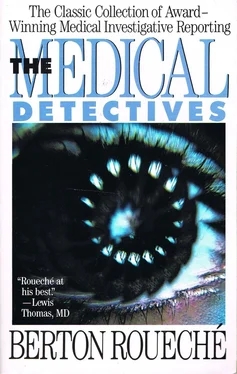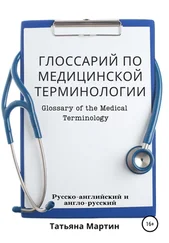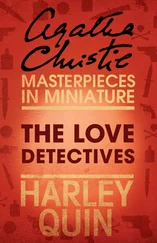"I hung around the school, trying to figure it out. It was amazing how quickly everything got back to normal. I talked to more teachers. I talked to some of the children. I talked with a neighborhood doctor who had been called when the trouble first began. They gave me a brainful of bits and pieces. I could see what had happened, but I couldn't see how it had happened. Sandy was what we call in epidemiology the index case. Everything that happened stemmed from her. But I couldn't find a clear connection. The timetable didn't seem to tell the right time. Sandy had slipped out of the cafetorium and collapsed in the clinic at about nine-thirty. But it wasn't until ten o'clock—until the nine-o'clock classes let out—that the wave of illness broke. Why did it take so long? And why did it happen when it did? I wandered around talking and listening, and trying to fit the pieces together. It's hard to remember now just how I did it. Did somebody tell me something? Or did I simply take a different look at something I already knew? Anyway, it suddenly all came together. The whole thing hung on coincidence—on two coincidences, actually. One of them had to do with Sandy and the fire-rescue people. They arrived at the school on the head secretary's summons a couple of minutes before ten. Sandy was still in her faint, or whatever it was. They lifted her onto a stretcher and carried her out and down the hall—at the very moment that the nine-o'clock classes, including the group rehearsing in the cafetorium, let out. The kids flowed out of the cafetorium. They saw Sandy passed out on a stretcher. They had seen her slip out of the rehearsal, and now they knew why. Something was wrong. And somebody reacted—I'm reconstructing now. Somebody complained of feeling sick. That triggered it That's all it takes in these cases. Hysteria took over. And then the second coincidence happened. That was the neighborhood doctor. He arrived at the school, he saw the fire-rescue squad, he saw the children reacting—and he smelled the funny smell of the adhesive on the new library carpet. He thought it was the smell of something toxic. He said something to that effect to somebody. And the word spread. That pulled the trigger on the second barrel.
"When I went back to the office, I knew what had happened, and why, and how. The rest was documentation. I was confident that it would bear me out. And it did. DiSalvo's thorough investigation confirmed his preliminary study. The physical environment of the building was safe and clean. We also did a comprehensive clinical study. The heart of it was a student questionnaire. We found that a total of seventy-three children had reported at least some symptoms of illness—seventy-three out of a total enrollment of around four hundred and fifty. Most of them—sixty-three—were in either the fifth or the sixth grade. Most of the chief reactors were girls. Don't ask me why, but girls—young girls—seem to be more susceptible than boys. In the Berry outbreak, girls outnumbered boys by more than two to one. Anyway, we did a special study of the seven children who were hospitalized along with Sandy. All of them had been in the first rehearsal class, and they all knew Sandy. We looked into their psychological background, and came up with some interesting data. Five of the seven were girls. One of these had a clear history of hypochondria. Another was always sick or sickly. Another had a habit of hyperventilating in moments of stress. Another had come to school that day feeling vaguely ill. Another was one of Sandy's closest friends. One of the boys was a chronic discipline problem. The other boy was described by the school as highly excitable.
"The questionnaire provided some very interesting information. The comments of some of the children who reported feeling sick that morning were particularly revealing. These were mostly in response to the question 'When you got sick, did you know that other children were sick, too?' I'll read you some of the comments. One girl answered, 'Yes, because Sandy fainted.' Another wrote, 'Yes—a lot of kids. I started to feel sick between Music and Language Arts, and then they carried me outside.' Another girl answered, 'I just knew that a boy vomited.' Her only symptom was nausea. Another girl wrote, 'Yes—Sandy was sick.' And a boy—one of the few boys—wrote, 'Yes, and after Sandy got sick and there was a fire drill, and when everybody was walking out of the building, I felt like a small headache.' Well, you get the drift. We also talked to Sandy. She turned out to be pretty much as expected. I mean, she was the right type. She was attractive. She was a good student. She was precocious. And she was very popular. She was looked up to."
"She was a kind of leader?" I asked. "She set the pattern?"
"Yes," he said. "I think you could say that."
"But what about her?" I asked. "What made her get sick?"
Dr. Nitzkin looked at me. "Oh," he said. "Sandy was really sick. She had some sort of virus. All that standing and singing in place was too much for her. She just passed out."
[1978]
CHAPTER 21
A Rain Day on the Vineyard
A little after one o'clock on the afternoon of Wednesday, August 16, 1978. a switchboard operator at the Bureau of Epidemiology of the national Center for Disease Control, in Atlanta, received a long-distance call from a man who asked to speak to someone in authority in the parasitic-disease division. He had, he said, some information to report, and he wanted some advice. The operator connected him with a young Epidemic Intelligence Service officer assigned to that division named Steven M. Teutsch.
"I don't know about authority," Dr. Teutsch says. "But I guess I was in charge." A white smile stirs in the depths of a curly black beard. "I happened to be the only doctor in our office that afternoon. So I took the call and gave my name, and the caller identified himself. He was a physician in practice in Grand Junction, Colorado, and he needed help. He then went into a rather complicated story. It took me a minute or two to get it straight. It seemed he had a patient in a Grand Junction hospital seriously ill with pneumonia—a man I'll call Daniel Stafford. He had become ill on August 11th, with a fever of a hundred and four degrees, headache, muscular aches and pains, loss of appetite, nausea, and a cough. He had been treated with penicillin but had shown no improvement. It also seemed that Stafford's wife—I'll call her Anne Lord Stafford—had been ill for several days with some similar pulmonary infection, but was now recovered. They were both in their early thirties, and they had recently returned from a family houseparty at her father's summer cottage on Martha's Vineyard. It was the doctor's understanding that two other guests at the family gathering had become sick and were hospitalized—one at the Martha's Vineyard hospital and the other at Beth Israel Hospital, in Boston. The patient at the Vineyard hospital was Mrs. Stafford's younger sister. I'll call her Patsy Lord Hooper. Mrs. Hooper had become sick on August 7 with much the same symptoms as her relatives out in Colorado. The Beth Israel patient was Patsy Lord Hooper's brother-in-law—John Hooper. And he was the particular reason for the Colorado doctor's call. The advice of a parasitologist was needed. John Hooper's illness was thought to be babesiosis.
"Well! That was interesting—very interesting. And the doctor's concern was very easy to understand. Babesiosis is one of our newer diseases. I should say newly identified and described—it is probably as old as any of them. But it's new to medicine. It isn't even mentioned in the standard medical texts. It is primarily a tick-borne disease of wild rodents, but it is readily transmitted by infected ticks to man. The causative organism is a protozoa—a blood parasite named Babesia microti .
Читать дальше












